refugee
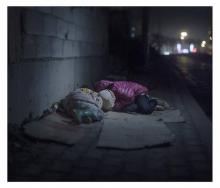
All of us are understandably sad about Paris — devastated. Many people have used striped profile pictures, candles, and flowers to express our collective solidarity. But in the wake of tragedy, almost half of the governors of the U.S. have responded with fear, announcing that they will do whatever they can to thwart the acceptance of Syrian refugees — from cutting funding for nonprofit resettlement agencies, to demanding religious screening tests.
If there’s one thing I learned from some of my friends who are refugees, it’s how to respond to grief. And there’s no one approach and they didn’t always get it right. But sometimes they did: Some refugees, in the shadow of shocking sadness, sang more than usual, prayed louder, invited more friends over for dinner, cooked their parent’s recipes. None of them responded with terrorism.
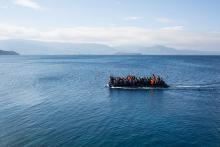
French president François Hollande announced on Nov. 18 that France will continue to resettle refugees.
Over the next two years, Hollande said that France would welcome 30,000 refugees from Syria and Afghanistan, among others. This is even more than his September commitment of 24,000.
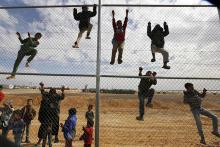
Evangelicals may be united that the Bible is the ultimate source of authority, but they are divided on how the Bible would lead us to respond to the growing crisis of refugees fleeing from Syria.
What is the best way to show Christian love and compassion? How is the church’s role different from the state’s? How do we show wisdom and prudence in securing the safety of our neighbors and nation?
These are just a few of the questions that evangelicals are grappling with. One evangelical pastor today told me, “My church members are all over the place on this!”

Shortly after the string of deadly, near-simultaneous attacks around the French capital, Faical Ouertani got a call from distraught friends in Tunisia.
“Their grandchildren were out celebrating a birthday,” the French Muslim said of two youngsters, also Muslims, who were shot by the assailants at a restaurant.
“They were probably among the first victims. Today, one is in the hospital; the other one is dead.”
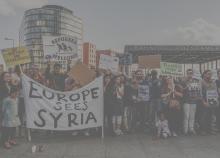
Christian groups are strongly condemning the anti-refugee rhetoric coming from top GOP leadership this week, reports POLITICO.
In the wake of the Paris attacks, many in the U.S. media speculated that one or more of the attackers had entered France as refugees from Syria, prompting state senators, governors, and even U.S. presidential candidates for the GOP to vow to close U.S. borders to Syrian refugees altogether.
These statements are being decried by Christians nationwide, including those with more historically conservative positions on immigration and foreign policy.

I’ve thought about this obedience to vulnerability in light of the current conversation our nation has been having about the refugee crisis, in particular since the attacks in Paris this weekend. The fearful calls to close our border have been disheartening, especially as we begin to enter the season of Advent. Jesus, as God incarnate, saw our sin and flaws and darkness — our hostility even — to the Light and still made himself vulnerable to live among us and die at our hand. Through the cross he offered a generous hospitality to us while we were still enemies of God — a feast of himself, for us to taste and see that God is good.
It should not be any different for us as followers of Christ. As any Christian knows, being part of the Body of Christ is often a dangerous proposition. We are in danger of getting hurt any time we come into contact with another person. We will sin against each other, we will experience conflict, and if we’re doing it right, we’ll bear each other’s suffering. We are knit together with people we may not typically associate, people who view the world in ways we may find misguided at best and dangerous at worst. It doesn’t matter — we’re still invited to the same feast and we’re still joined together in the same family, drinking out of the same cup the way family members and close friends do.
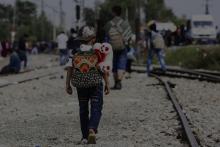
As we stand together around the world, shocked and mourning with the thousands who lost their fathers, mothers, sisters, brothers, relatives, and friends in France, Lebanon, and Iraq, one thing bothers me most about the narrative around the terrorist attacks in Paris.
From the moment first reports started streaming in from France, even when the details surrounding the tragedy were very scarce, mainstream media pundits were far too eager to bring Syrian refugees into the story of the Paris massacre. They planted the seeds of doubt into the minds of millions that somehow Syrian refugees shared responsibility for the massacre.
Two months ago I worked on the last several miles of the refugee trail from Syria, Iraq, and Afghanistan to the Croatian border. I helped drive nearly 100 refugees to the border, and distributed food, water, clothes, and shoes to at least 2,000 more.
I still remember the stories of some who did not hesitate to tell my team why they left Syria or Iraq.
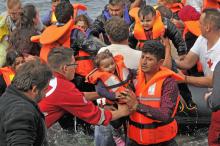
Whether you like it or not, Christians are called to help the world’s most abused, hurt, helpless, exploited, and destitute.
If you’re a follower of Christ passionate about social justice, of if you attend a church that claims to be enthusiastic about global missions, or if you’re part of a Christian organization that facilitates ministry, you’ve been handed a golden opportunity — the ability to minister to millions of people in desperate need.
This is a chance to be radically countercultural — to glorify Christ through selfless sacrifice, hospitality, and love. Being a Christ-follower isn’t easy, and it will require hard work, but it’s worth it.

As the the refugee crisis worsens, President Obama has directed his administration to resettle at least 10,000 Syrians over the course of the year, reports The New York Times.
Pressure on the U.S. has been mounting from European nations to increase its promised quota of 2,000. White House press secretary Josh Earnest made the announcement Sept. 10.
According to The New York Times,
The announcement brought a variety of reactions that underscored how the refugee crisis has become another polarized political question. Aid groups called the administration’s action a token one given the size of the American economy and population, while a number of Republicans warned that Mr. Obama was allowing in potential terrorists. “Our enemy now is Islamic terrorism, and these people are coming from a country filled with Islamic terrorists,” said Representative Peter T. King, Republican of New York. “We don’t want another Boston Marathon bombing situation.”

There is no political outcome that will make these children not drowned. There is no politics that will pull their shirts down to cover their exposed tummies, the way a parent’s loving hand would do. There is no politics that will make their drenched clothing anything other than the last outfit their parents ever clothed them in, unaware when they did so that it would be the clothing in which their children would die. There is no politics that will give these children another life that does not end in terror and despair and cold water. (God, God, how does one write words like this?) There is no politics that will give their parents anything but the end they had: of going into the dark knowing that their dear ones were lost forever.
All this is permanent. It is done and cannot and will not and will never be undone. And while I am all for good politics, which is to say I am all for a good future, and so I am all for doing better by the refugees that yet live, I also refuse to let the past go as if it were merely the gravel under the sub-foundation of whatever shiny tomorrow we happen to build next.
There is no politics that can redeem what time has irretrievably taken. To stand as witness to the past is to stand either in utter nihilism and despair, or in the desperate, desperate hope that in the end a Redeemer will walk upon the earth, who will bring forth those whose flesh was destroyed, to see and be loved forever by God.


Night.
The sheep huddled against this big rock.
Jake keeps watch while I wrestle with sleep:
—wool prices down, third year
—owner talks of selling out
—Jake and me—Where do we go?
—Martha’s carrying our fifth child
—rumors that Herod’s at it again,
—this time killing babies.
—Same old story:
the Empire trades in fear.
Where can we run?
Like papa says, “I hate being poor.”
The residents of Newtok, Alaska could see their village washed away within five years, making them the first American climate refugees. Newtok is surrounded by the Ninglick River, which continues to carry off 100ft or more of land each year. The highest point in the village could be underwater by 2017. The small community of 350 will be scattered across Alaska, with Newtok ceasing to exist. The Guardian reports:
"The snow comes in a different timing now. The snow disappears way late. That is making the geese come at the wrong time. Now they are starting to lay their eggs when there is still snow and ice and we can't go and pick them," Tom said. "It's changing a lot. It's real, global warming, it's real."
Read more here.
Baby steppin': Economy grew 2.5 percent in the third quarter. Democrats first offer: $3 trillion for debt. Immigration is a faith issue. Harsh rhetoric to derail the GOP? The canon of St. Paul's Cathedral in London resigns over plans to evict Occupy London protesters. Elizabeth Warren and the #OccupyWallStreet election test.
[caption id="attachment_34028" align="alignleft" width="214" caption="Detail of a sculpture at the site of a former slave market, Christ Church, Zanzibar. By Cathleen Falsani."][/caption]
[Editors' note: As part of Sojourners' campaign to end the war in Afghanistan, we will run a weekly blog about issues in Afghanistan to educate our readers about the latest news and developments related to the war, the U.S. military's strategy, and the people impacted by our decisions. Read more about our campaign at www.sojo.net/afghanistan.]
The United States government has quietly terminated a popular exchange program for high school students from Afghanistan after numerous participants fled to Canada as refugees rather than return home.
The program, the State Department's Youth and Exchange Study (YES), was established in 2002 to provide scholarships to students from countries with significant Muslim populations, and "allows participants to spend up to one academic year in the U.S. while they live with host families, attend high school and learn about American society and values." In 2007, YES Abroad was established to provide a similar experience for U.S students in selected YES countries.